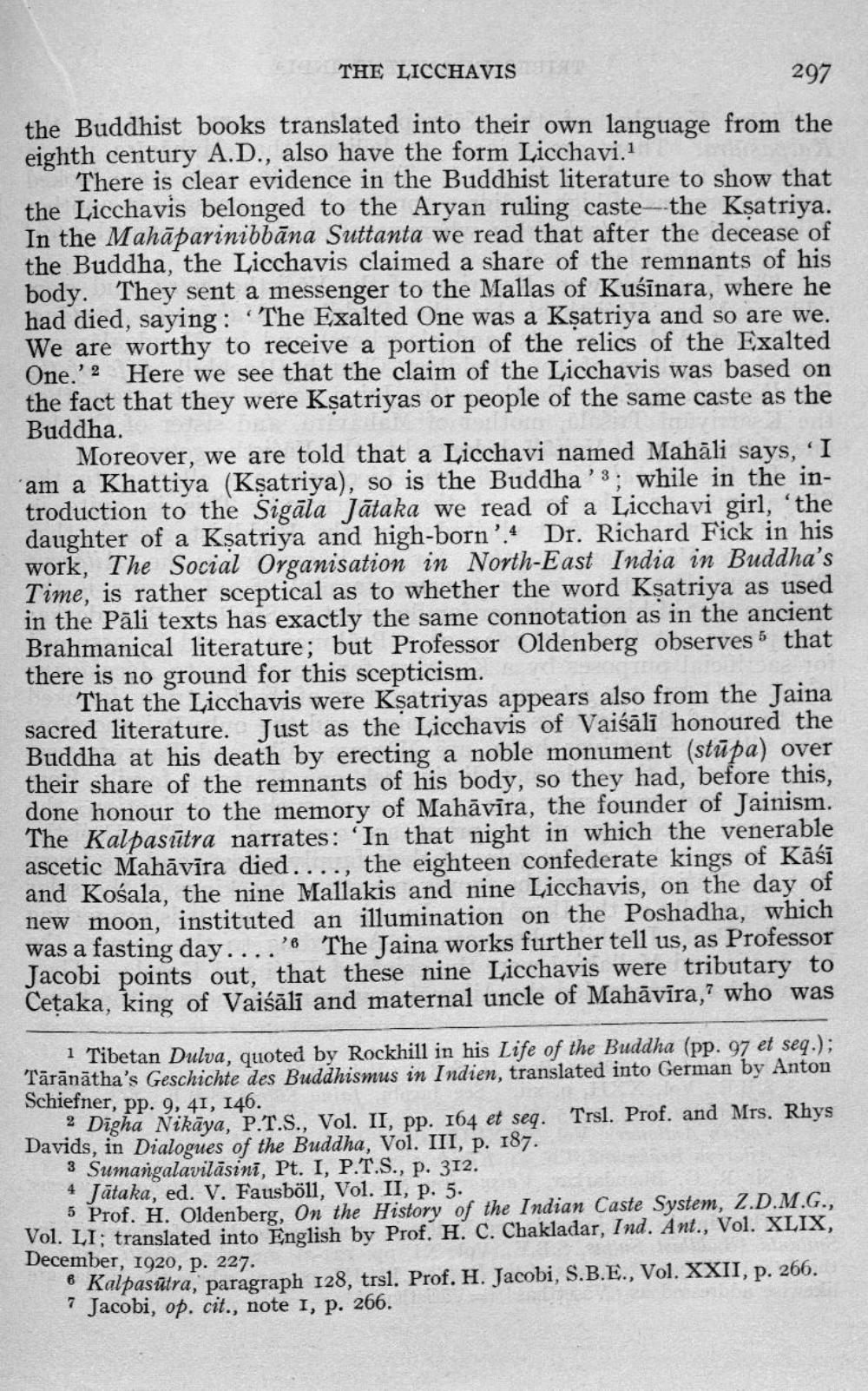________________
THE LICCHAVISTAR
297
the Buddhist books translated into their own language from the eighth century A.D., also have the form Licchavi.1
There is clear evidence in the Buddhist literature to show that the Licchavis belonged to the Aryan ruling caste--the Kṣatriya. In the Mahaparinibbana Suttanta we read that after the decease of the Buddha, the Licchavis claimed a share of the remnants of his body. They sent a messenger to the Mallas of Kuśinara, where he had died, saying: The Exalted One was a Ksatriya and so are we. We are worthy to receive a portion of the relics of the Exalted One.' 2 Here we see that the claim of the Licchavis was based on the fact that they were Kṣatriyas or people of the same caste as the Buddha.
"
Moreover, we are told that a Licchavi named Mahāli says, 'I am a Khattiya (Kṣatriya), so is the Buddha's; while in the introduction to the Sigala Jataka we read of a Licchavi girl, 'the daughter of a Kṣatriya and high-born'. Dr. Richard Fick in his work, The Social Organisation in North-East India in Buddha's Time, is rather sceptical as to whether the word Kṣatriya as used in the Pali texts has exactly the same connotation as in the ancient Brahmanical literature; but Professor Oldenberg observes that there is no ground for this scepticism.
That the Licchavis were Kṣatriyas appears also from the Jaina sacred literature. Just as the Licchavis of Vaiśali honoured the Buddha at his death by erecting a noble monument (stupa) over their share of the remnants of his body, so they had, before this, done honour to the memory of Mahavira, the founder of Jainism. The Kalpasutra narrates: 'In that night in which the venerable ascetic Mahavira died...., the eighteen confederate kings of Kāśī and Kośala, the nine Mallakis and nine Licchavis, on the day of new moon, instituted an illumination on the Poshadha, which was a fasting day....' The Jaina works further tell us, as Professor Jacobi points out, that these nine Licchavis were tributary to Ceṭaka, king of Vaisali and maternal uncle of Mahavira," who was
1 Tibetan Dulva, quoted by Rockhill in his Life of the Buddha (pp. 97 et seq.); Taranatha's Geschichte des Buddhismus in Indien, translated into German by Anton Schiefner, pp. 9, 41, 146.
2 Digha Nikaya, P.T.S., Vol. II, pp. 164 et seq. Trsl. Prof. and Mrs. Rhys Davids, in Dialogues of the Buddha, Vol. III, p. 187.
3 Sumangalavilasini, Pt. I, P.T.S., p. 312.
4 Jātaka, ed. V. Fausböll, Vol. II, P. 5.
5 Prof. H. Oldenberg, On the History of the Indian Caste System, Z.D.M.G., Vol. LI; translated into English by Prof. H. C. Chakladar, Ind. Ant., Vol. XLIX, December, 1920, p. 227.
6 Kalpasutra, paragraph 128, trsl. Prof. H. Jacobi, S.B.E., Vol. XXII, p. 266. 7 Jacobi, op. cit., note 1, p. 266.




